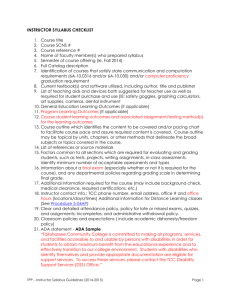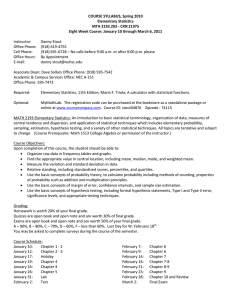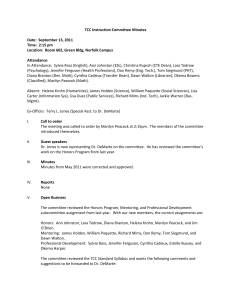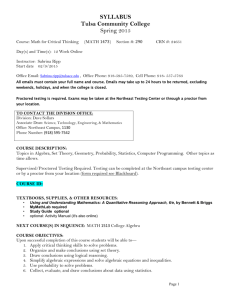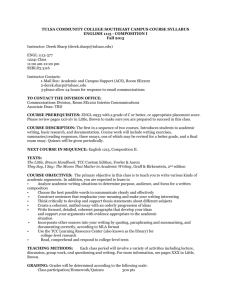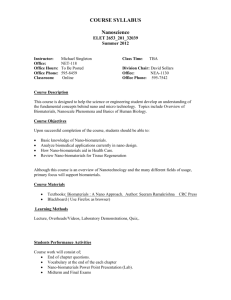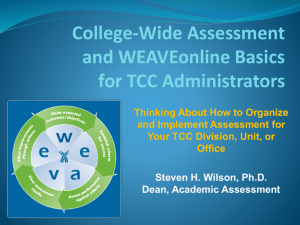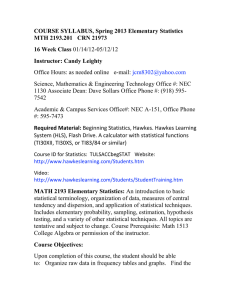english 1213 - Blackboard
advertisement
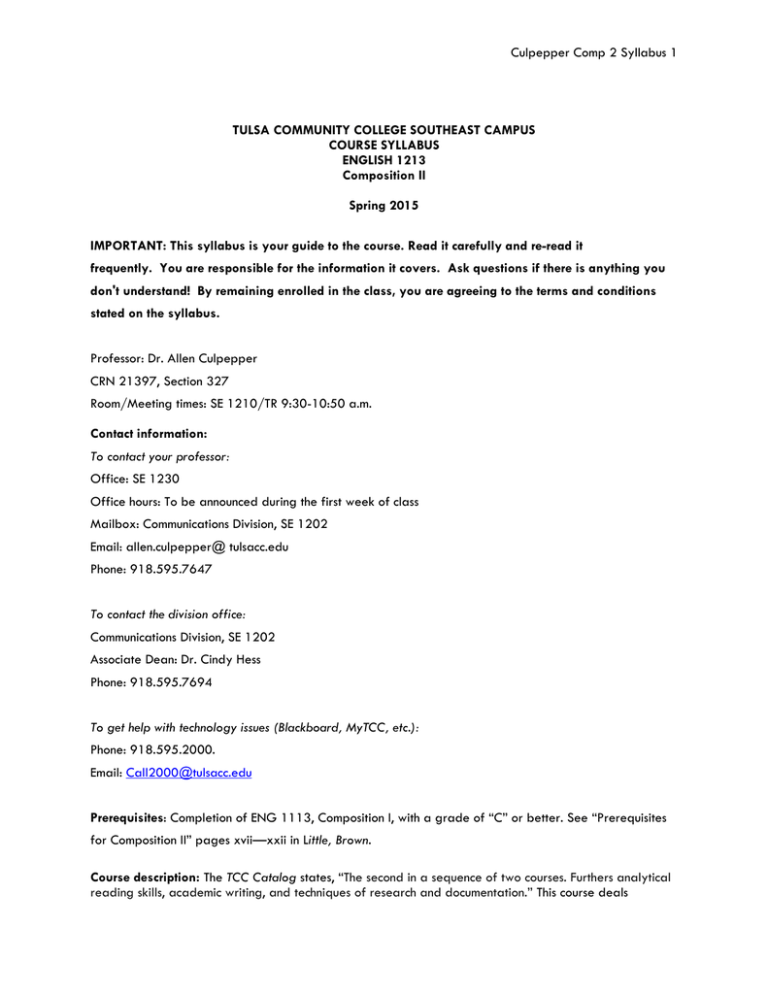
Culpepper Comp 2 Syllabus 1 TULSA COMMUNITY COLLEGE SOUTHEAST CAMPUS COURSE SYLLABUS ENGLISH 1213 Composition II Spring 2015 IMPORTANT: This syllabus is your guide to the course. Read it carefully and re-read it frequently. You are responsible for the information it covers. Ask questions if there is anything you don't understand! By remaining enrolled in the class, you are agreeing to the terms and conditions stated on the syllabus. Professor: Dr. Allen Culpepper CRN 21397, Section 327 Room/Meeting times: SE 1210/TR 9:30-10:50 a.m. Contact information: To contact your professor: Office: SE 1230 Office hours: To be announced during the first week of class Mailbox: Communications Division, SE 1202 Email: allen.culpepper@ tulsacc.edu Phone: 918.595.7647 To contact the division office: Communications Division, SE 1202 Associate Dean: Dr. Cindy Hess Phone: 918.595.7694 To get help with technology issues (Blackboard, MyTCC, etc.): Phone: 918.595.2000. Email: Call2000@tulsacc.edu Prerequisites: Completion of ENG 1113, Composition I, with a grade of “C” or better. See “Prerequisites for Composition II” pages xvii—xxii in Little, Brown. Course description: The TCC Catalog states, “The second in a sequence of two courses. Furthers analytical reading skills, academic writing, and techniques of research and documentation.” This course deals Culpepper Comp 2 Syllabus 2 specifically with critical reading, argumentation, and research-based writing and is designed to improve your college-level reading and writing skills. The theme for this section will be theatrical works as both performance and literature. The theme for our reading, writing, and research will be theatrical works as both performance and literature. Coursework will include, but not necessarily be limited to, reading and discussion, written commentaries on plays, a performance review (note that students will be expected to attend and review a theatrical performance), and an extended research project including a research proposal, annotated bibliography, and a research paper of approximately 10 pages. (The research project will include an argumentative research paper, which may take the form of either an interpretative analysis of a play or a proposal for a production of a play, depending on individual students’ backgrounds and objectives.) The course will conclude with a final exam containing one or more essay questions. Next course in sequence: None. Texts: Euripides. Medea. Trans. Rex Warner. Dover Thrift Editions. New York: Dover, 1993. Print. ISBN 9780486275482 Shakespeare, William. Troilus and Cressida. Ed. Daniel Seltzer. Signet Classic Shakespeare. Newly Rev. ed. New York: Signet, 2002. Print. ISBN 9780451528476. Ibsen, Henrik. Hedda Gabler. Dover Thrift Editions. New York: Dover, 1990. Print. ISBN 9780486264691. Churchill, Caryl. Cloud 9. Acting ed. New York: Samuel French, 1979. Print. ISBN 9780573618741. Martin, Jane. Keely and Du. New York: Samuel French, 1993. Print. ISBN 9780573694905. Bennett, Alan. The History Boys. London: Faber, 2004. Print. ISBN 9780571224647. Additional readings will available online. Note: It’s a big stack of books, but most of them are small and relatively inexpensive. The plays are listed in the order in which we will read them (roughly in historical order so we can get a sense of the changing conventions of theatre over the years.) TCC will be presenting one of the plays on our reading list, Keely & Du (April 10, 11, 16, 17, 18 at 8:00 p.m. and April 12 & 19 at 2:00p.m.), so it should be possible for most of us to see a live performance. TCC’s other spring production, Young Frankenstein (February 27, 28, March 5, 6 & 7 at 7:30pm; March 1 & 8 at 2:00pm), is not on our reading list because it’s hard to “read” a musical, especially if not everyone can read music, but it will still provide an opportunity to see some live theatre. Course objectives: The main objective of Composition II is to teach students how to produce a focused, well-developed college research paper. To that end, students will need to apply the skills learned in Composition I to longer and more challenging writing assignments and to demonstrate more depth and complexity of thought in their essays. Specifically, Composition II students should demonstrate that they can analyze a variety of scholarly and popular texts to show how content, organization, style, and tone are related to the author’s purpose, audience, and subject matter use logical, emotional, and ethical appeals and rebuttals to construct formal, academic arguments evaluate and select authoritative sources for college-level research identify appropriate evidence from primary and secondary sources distill, synthesize and document evidence from primary and secondary sources understand and apply the general conventions of MLA documentation participate actively and competently in scholarly “conversation” in both oral and written forms Additional objective for this section: read, analyze, discuss, and write about the plays on our reading list Culpepper Comp 2 Syllabus 3 Teaching methods: Teaching methods will include, but will not necessarily be limited to, discussion (the primary classroom method), lecture (in small amounts), readings from the assigned texts, a variety of writing assignments, and feedback on written work. Teaching methods are not nearly as important as the strategies you implement to learn. You should do all the assigned reading and writing; take notes on assigned texts and lectures; participate earnestly in class discussions and activities; read my feedback on graded work; study specific writing strategies; and spend sufficient time reading, researching, writing and revising. Writing assignments and grading: Discussion (participation), 100 points Commentary on Medea, 500 words, 50 points Commentary on Troilus and Cressida, 500 words, 50 points Commentary on Hedda Gabler, 500 words, 50 points Commentary on Cloud 9, 500 words, 50 points Commentary on Keely & Du, 500 words, 50 points Commentary on The History Boys, 500 words, 50 points Performance Review, 500 words, 50 points Research proposal, 500 words, 50 points Annotated bibliography (8-10 sources), 100 points Research paper, 2000-3000 words, 300 points Final exam, 750 words, 100 points Total, 1000 points possible A=1000-900; B=899-800; C=799-700; D=699-600; F=599-0Note: Because grades are calculated on the basis of accumulated points rather than percentages, there will be no rounding of the final grade. Written work will be graded using the criteria described in your Little, Brown Handbook, p. xxvi-xxii. More specific information will be given for each kind of assignment. English professors assign "I" grades (“Incompletes”) only when genuine emergencies prevent a student from completing the class and/or from withdrawing before the deadline and only when the student is earning a satisfactory ("C" or better) grade. Late work: I DO NOT ACCEPT LATE WORK. All work must be submitted to the appropriate area in Blackboard and in hard copy to the professor as required. I will set the submission windows to expire when the deadline passes. Do NOT email me your assignment unless I specifically instruct you to do so. I have tried that method, and it just doesn’t work. Attendance: In this course, each class meeting is important, and student participation is a vital ingredient to success this semester. If you arrive to class without completing assignments or are genuinely not interested in the course, your overall lack of participation will be a distraction to others who are intent on advancing their intellectual pursuits. While this policy does not dictate a specific penalty, absence is not without serious consequence. Students who are frequently absent from this course should not expect a passing grade. Students who miss more than nine hours of class and/or who fail to turn in a significant number of assignments may be dropped from the class, which will result in an “AW” on the transcript (see below for more details). Professors also may choose to assign a grade of “F” to students who choose to remain in the course but do not complete its requirements successfully. Students who miss class should not expect any outside assistance from the instructor; if a student misses class for whatever reason, it is his or her responsibility to acquire classroom material from another student. Culpepper Comp 2 Syllabus 4 Students who attend class regularly but do not participate in class activities should also expect lowered grades. Withdrawal: The last day to drop this course and receive a refund is Jan. 4, 2014. Students who drop before April 11, 2014, will receive a W on their transcripts. A “W” and an “AW” are grade-point neutral, but non-completion of a class may affect financial aid for the current and future semesters. Students who drop or who are dropped by an instructor may receive an outstanding bill from TCC if the recalculation leaves a balance due to TCC. Contact the Counseling Office at any TCC campus to initiate withdrawal from a course (“W” grade) or to change from Credit to Audit. Extra credit: I rarely give extra-credit assignments. If a student is having trouble getting good grades on the regular assignments, giving that student more work can be counterproductive. For more on extra credit, see Little, Brown, page xix. (A small amount of extra credit might be awarded occasionally as incentive for attending a campus event outside of class time or as make-up work for missed assignments, but you should not expect extra credit to make up for poor performance in the class, missing assignments, etc.) Academic dishonesty or misconduct: Academic dishonesty or misconduct is neither condoned nor tolerated at TCC. For details about what constitutes dishonesty or misconduct, see the college’s Academic Code of Integrity, available online at http://www.tulsacc.edu/sites/default/files/Student_Code_of_Conduct.pdf. Plagiarism: Please see “Plagiarism” on pages xxvi in Little, Brown, as well as Chap. 44: “Avoiding Plagiarism and Documenting Sources.” Plagiarism refers to a specific form of academic dishonesty involving the use of any texts, documents, online materials, words, ideas, sentence structures, pieces of information, statistics, figures, illustrations, creative works, ways of thinking, etc., that are not your own without giving credit to the author. TCC’s Academic Code of Integrity, available in the Student Policies and Resources Handbook at http://www.tulsacc.edu/sites/default/files/Student_Code_of_Conduct.pdf, further defines plagiarism, lists its common forms, and explains how to avoid it. If you have any doubts, consult me before you submit an assignment. If you submit any assignment containing plagiarism of any kind, and it is your first offense, you will receive a score of 0 for that assignment. If you submit an assignment containing plagiarism and it is your second offense, you will receive a grade of F for the course, and I will report you to the Dean of Student Services and the Associate Dean of the Communications Division for violation of TCC’s policies on academic integrity. I TAKE PLAGIARISM VERY SERIOUSLY. Format and submission protocol for course work: Essays and summaries must follow MLA formatting and documentation as described in Little, Brown. All papers for this class MUST be submitted in two forms: They MUST be saved as a Word document and submitted through SafeAssign, a plagiarism-detection tool accessible in Blackboard, AND they must be printed out and submitted to the professor. I will not grade papers until they are submitted in both forms. Do NOT email me papers unless I specifically tell you to do so. Classroom etiquette: See Little, Brown, page xxvii. Students who do not follow the etiquette policy (regarding appropriate class behavior) may be dismissed from class and required to meet with the dean of student services. Moreover, violation of the etiquette policy will affect the class participation grade. Culpepper Comp 2 Syllabus 5 Disability resources: It is the policy and practice of Tulsa Community College to create inclusive learning environments. Accommodations for qualifying students in compliance with the Americans with Disabilities Act (ADA) and Section 504 of the Rehabilitation Act are available. To request accommodations, contact the Education Access Center (EAC) at eac@tulsacc.edu or call (918) 595-7115 (Voice). Deaf and hard of hearing students may text (918) 809-1864. Email: Every student enrolled at Tulsa Community College is issued a TCC email account. Students are expected to check their College email account on a regular basis in order to stay current with Collegerelated communications, particularly those that may be time sensitive in nature. Students will be held responsible for the information transmitted to the College email account. For information about the Office 365 e-mail system for students, please visit http://www.tulsacc.edu/office365/students. I check email frequently Monday-Friday and will respond as quickly as possible. I also try to check email at least once during the weekend. Inclement weather: If extreme weather conditions or emergency situations arise, TCC always gives cancellation notices to radio and television stations. This information is also posted on the TCC website (www.tulsacc.edu). If you lose power, call the TCC main number (918.595.7000) for an updated, recorded message regarding closure. If the college has to close because of weather, students will be expected to complete any homework assigned and may have to complete assignments online, using Blackboard. FERPA: The Family Educational Rights and Privacy Act (FERPA) is a Federal law designated to protect the privacy of a student’s education records and academic work. The law applies to all schools, colleges, and universities that receive funds under an applicable program of the U.S. Department of Education. This law is applicable to students at TCC. All files, records, and academic work completed within this course are considered educational records and are protected under FERPA. It is your right as a student in this course to expect that any materials you submit in this course, as well as your name and other identifying information, will not be viewable by guests or other individuals permitted access to the course. A student may sign a waiver of his or her FERPA rights through the Admissions/Enrollment Services or the Dean of Student Services offices. This waiver authorizes the release of academic records to the individuals identified by the student. While a FERPA waiver permits the release of information to parents, it does not compel the release of information. Faculty and advisors may use their discretion as to when the release of information would not be warranted. General Education goals: The General Education goals are designed to ensure that graduates of Tulsa Community College have the skills, knowledge, and attitudes to carry them successfully through their work and their personal lives. General Education goals relevant to this course include critical thinking, effective communication, engaged learning, and technological proficiency. English discipline goals: All English courses are designed to help students meet the English discipline goals, which are effective writing, critical reading, informed discussion, and scholarly research. Institutional statement: Each student is responsible for being aware of the information contained in the TCC Catalog, the TCC Student Policies & Resources Handbook, and semester information listed in the class schedule. All information may be viewed on the TCC website: www.tulsacc.edu. Policy adjustments: Occasionally, when genuine emergencies or problem situations occur, the course policies outlined here can be modified to help a student complete the course if the student has been attending regularly, has completed most assigned work, and is earning at least a "C." It is always in your best interest, therefore, to contact me immediately if a crisis situation prevents you from attending class or completing assignments. Culpepper Comp 2 Syllabus 6 The specific needs of the class may require minor changes in the policies in this syllabus. Students will be given written notification of any policy changes. Tentative schedule: Please follow the schedule below. Any schedule changes will be based on the needs of the class and will be provided in writing. Reading assignments should be completed before class on the date indicated. Papers (in both paper and electronic form) are due by the beginning of class on the dates indicated unless you are otherwise instructed. Week 1 Jan. 13—Introduction of course, theme, and participants; announcement of readings for Jan. 15 class Jan. 15--Introduction to Medea and the Greek theatre Week 2 Jan. 20—Read Medea, pages 1-24 Jan. 22—Read Medea, pages 25-47 Week 3 Jan. 27—Read article about Medea Jan. 29—Commentary on Medea due. Introduction to Troilus & Cressida and Shakespearean theatre Week 4 Feb. 3—Read Troilus, Acts 1 & 2 Feb. 5— Read Troilus, Act 3 Week 5 Feb. 10— Read Troilus, Acts 4 & 5 Feb. 12—Read article about Troilus. Week 6 Feb. 17—Commentary on Troilus due. Introduction to 18th- and 19th-century theatre and Hedda Gabler Feb. 19— Read Hedda, Act 1 Week 7 Feb. 24— Read Hedda, Act 2 Feb. 26— Read Hedda, Acts 3 & 4 Week 8 March 3— Read article about Hedda March 5—Commentary on Hedda due. Introduction to Cloud 9 and Post-modern theatre Week 9 March 10—Read Cloud 9, Act 1 March 12—Read Cloud 9, Act 2 Week 10 March 17 — SPRING BREAK March 19—SPRINK BREAK Week 11 March 25—Read article about Cloud 9. March 27—Commentary on Cloud 9 due. Introduction to Keely & Du and contemporary theatre Week 12 Culpepper Comp 2 Syllabus 7 March 31— Read Keely & Du, Scenes 1-14. Research proposal due. April 2—Read Keely & Du, Scenes 15-18 Week 13 April 7—Read article about Keely & Du. Introduction to The History Boys. April 9—Commentary on Keely & Du due. Read History Boys, Act 1 Week 14 April 14— Read History Boys, Act 2. Annotated bibliography due. April 16— Read article about History Boys. Week 15 April 21—Research paper draft due. April 23—Commentary on History Boys due. Week 16 April 28— Revised research paper due. April 30—Performance review due. Course wrap-up and instructions for final exam Week 17 (Exam week) Thursday, May 7—Take-home final exam due by 11 a.m.

